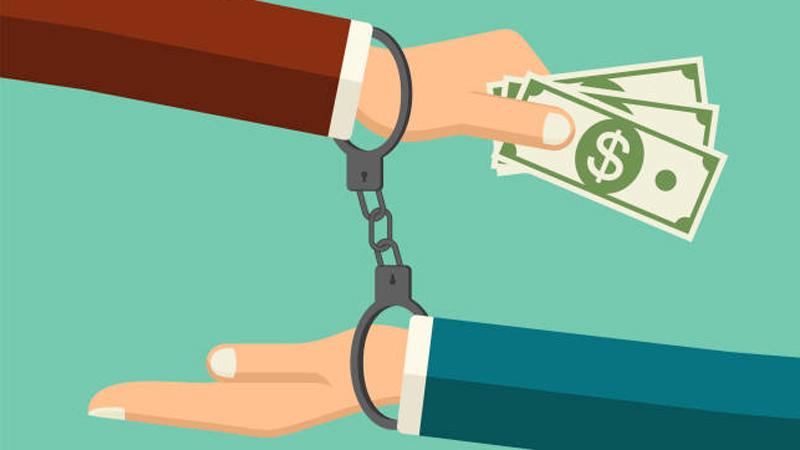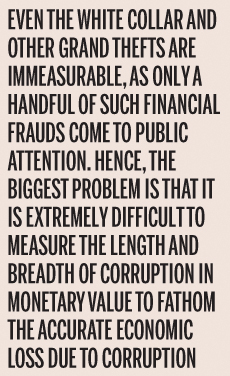
The term “corruption” is a familiar word in Sri Lankan society; it is commonly heard every day and is defined in many ways. The closest definition this writer can think of is a statement by the incumbent American president, Joe Biden, who said that corruption is another type of tyranny.
It is a struggle that ordinary people encounter every day in their day-to-day lives. Corruption exists in almost every sector in the country. However, the general belief is that the most notorious in the Sri Lankan context are the political manipulations and the public sector institutions, where dubious and unfair methods are being practised in many activities.
Corruption, which exists from the highest tiers of politics to the lowest levels of public administration, is viewed as an extremely serious issue in Sri Lanka at all social levels. The efforts of the general public to fight corruption are negatively impacted most often by the protection of the perpetrators, predominantly through politicians and other powerful forces engaged in various nefarious activities.
Irony
The institutional reforms discussed on public platforms for the past many decades have not been realised to date due to numerous manipulations by the political hierarchy. The irony is that most Sri Lankans partially accept bribery and corruption as an unescapable part of life. One way or the other, they are forced to bribe the officials in some way to get important tasks done at public offices.
 A cancer at the very heart of our democratic process is the relationship between corruption and politics. In the contemporary Sri Lankan political arena, hardly a politician is seen without newly earned prosperity.
A cancer at the very heart of our democratic process is the relationship between corruption and politics. In the contemporary Sri Lankan political arena, hardly a politician is seen without newly earned prosperity.
Even those in so-called popular left-wing parties who publicly declare that they belong to the common people, if one investigates carefully, plenty of evidence can be unveiled about undeclared wealth.
How can a society be clean if those who are responsible for passing legislation prohibiting corruption are corrupt themselves? They are also a part of the corrupt system. It is a public secret that almost all politicians attempt to reward the generous worthies who donate lavishly to their respective political campaigns. The easiest way to make such generous donations to supporters is to milk the state and public funds. The tragedy is that political parties are aware of this gloom, yet they willingly cooperate to keep it going, regardless of the negativities they create for the country.
Sri Lanka was placed in the 79th position in the Corruption Perception Index (CPI) in 2012. In comparison, less than 10 years later, in 2021, the country went down by 23 positions and ranked in 102nd place. This is evidence of how deep corruption has escalated during the past 10 years. The report clearly shows the year-on-year increase in corruption in Sri Lanka.
Inefficiencies in the public sector make it easier for public officials to demand bribes in exchange for timely service and force the public to pay bribes in exchange. This exacerbates corruption. Because people have come to accept that, despite it being wrong, this is the most convenient and feasible course of action for them. Their general opinion is that, however wrong the action is, it is justifiable because there are bigger corruptions going on. The salient fact that they do not see and are unaware of is that they are losing out on many things because of widespread corruption.
Gruesome stories of corruption are coming out every single day in the news. The frequent media reports on the hearings of the Committee on Public Enterprises (COPE) and the Committee on Public Accounts (COPA) show the depth of corruption, financial mismanagement, lapses and weaknesses, and other undue activities of state-owned enterprises, public corporations, and other semi-government institutions. These two committees have the power to summon public enterprises and corporations in order to investigate their financial performances.
Regrettably, however, during the past many years, despite the findings of numerous malpractices and corruption in every single institution they investigated, the two committees were not able to bring the culprits to book as the committees do not have prosecution powers. Hence, the officials who are responsible go scot free after every inquiry.
The magnitude of corruption and mishandling revealed at these hearings is at such dangerous heights; any sane person may wonder how the country has survived thus far.
The corruption menace is not limited to the public sector. Even the private sector is a considerable part of the bribery equation. Often, private sector institutions offer bribes to secure Government procurements, particularly through tenders, both small and large. Public institutions throughout the country, including departments, municipal councils, urban councils, and all other local government establishments, are engaged in nefarious activities, hand in hand with private-sector suppliers.
Careful research will reveal that offering and taking bribery is one salient factor in securing a Government order, regardless of the amount involved.
The Commission to Investigate Allegations of Bribery or Corruption (CIABOC), the premier institute responsible for anti-corruption in the country, has extensive investigative powers. The commissioners are even immune to prosecution for their official acts performed in good faith as per the CIABOC Act. The commission is legally one of the most powerful institutions in the country, protected by various statutory laws and empowered to investigate and prosecute any institution or individual engaged in bribery or corruption.
Yet, it is no secret that the commission hierarchy was always appointed by successive governments on the basis of political bias. This means that the wrongdoers are safe as long as they are protected by politicians. Hence, if one runs through the CIABOC website, one finds that the vast majority of convicts are junior government officials who were involved in minor corruptive acts.
Almost all cases involving politicians and high-ranking bureaucrats accused of bribery and corruption were either dropped (due to technical errors) or dismissed due to a lack of evidence. Also, many other investigations are stagnated for a number of reasons.
According to legal experts, Sri Lanka’s existing laws are adequate to take effective punitive actions against the perpetrators. Yet, the active enforcement of bribery and corruption laws is inefficient, lethargic, and ineffective, a common phenomenon in Sri Lanka in all similar regulatory institutions.
Inequality
The inequality of enforcement is clearly evident in many recent incidents. The public grievance is that the law acts defiantly towards those who are less affluent than those who are powerful.
In economic terms, corruption is a profound cost for the country. The total loss will certainly be incalculable as corruption in the country is immensely deep-rooted. Although the large losses can be calculated, it is difficult to put a definite figure on widespread petty corruption.
Even the white collar and other grand thefts are immeasurable, as only a handful of such financial frauds come to public attention. Hence, the biggest problem is that it is extremely difficult to measure the length and breadth of corruption in monetary value to fathom the accurate economic loss due to corruption.
Corruption through bribery, malpractices, deceit, and other means exists and thrives as the general public seems to be accepting of it as normal. They feel that they have no alternative other than to get involved with officials to complete tasks. They too have become elements of corruption with their long years of practical experience.
Hence, the citizenry must come together and demand a more effective anti-corruption drive and better transparency in all public institutions.
Customarily, during elections, where the public can greatly influence politicians and their respective parties, the manifestos do not seem to extend adequate prominence to anti-corruption. Usually, even when the subject is taken up in such documents, the content is lame and unimportant.
Hence, the general public should demand pre-eminence in anti-corruption, in the political agendas of all parties if they seek power.
